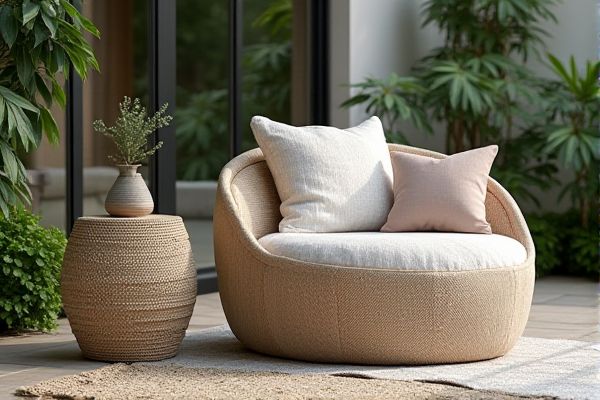
Outdoor poufs provide lightweight, portable seating with soft, cushioned comfort perfect for lounging, while garden stools offer sturdy, durable functionality that can serve as both seating and a side table in your outdoor space. Explore the rest of the article to discover which option best suits Your outdoor living needs.
Table of Comparison
| Feature | Outdoor Pouf | Garden Stool |
|---|---|---|
| Material | Water-resistant fabric, foam-filled | Durable materials like metal, wood, ceramic |
| Function | Seating, footrest | Seating, side table |
| Portability | Lightweight, easy to move | Heavier, less portable |
| Weather Resistance | Moderate; water-resistant but can degrade over time | High; designed for outdoor exposure |
| Comfort | Soft and cushioned | Firm, minimal cushioning |
| Design Styles | Modern, casual | Traditional, decorative |
| Maintenance | Requires cleaning and occasional fabric care | Easy to clean, low maintenance |
Introduction to Outdoor Poufs and Garden Stools
Outdoor poufs and garden stools serve as versatile seating solutions for your patio or garden space, offering both comfort and style. Outdoor poufs are typically cushioned and soft, providing a cozy spot to relax or rest your feet, while garden stools are often made from durable materials like ceramic, metal, or wood, doubling as seats or occasional tables. Choosing between the two depends on your desired aesthetic, functionality, and the durability needed for your outdoor environment.
Key Differences Between Outdoor Poufs and Garden Stools
Outdoor poufs offer soft, cushioned seating made from weather-resistant fabrics, providing comfort and casual style for your patio or garden. Garden stools are typically constructed from sturdy materials like ceramic, metal, or wood, serving as both functional seating and decorative accents. You can choose poufs for relaxed lounging, while garden stools add a durable, versatile element that can also act as side tables or plant stands.
Material Comparison: Durability and Weather Resistance
Outdoor poufs are often made from durable fabrics like polyester or acrylic blends, offering excellent resistance to UV rays and moisture while providing comfortable seating. Garden stools, typically crafted from materials such as ceramic, metal, or resin, excel in weather resistance with superior durability against rain, sun, and temperature fluctuations. While poufs prioritize softness and portability, garden stools deliver robust structural integrity and long-lasting outdoor performance.
Comfort and Ergonomics: Which Offers Better Seating?
Outdoor poufs provide soft, cushioned seating that contours to the body, enhancing comfort during extended use, while garden stools often feature hard, flat surfaces designed for short-term or decorative seating. Ergonomically, poufs support a more relaxed posture with their plush materials, reducing pressure points, whereas garden stools offer minimal ergonomic support but serve well as multipurpose pieces that can double as side tables. For superior comfort and ergonomic benefits, outdoor poufs generally outperform garden stools in providing a cozy and supportive seating experience.
Versatility in Outdoor Spaces
Outdoor poufs offer exceptional versatility with their lightweight design, easy mobility, and ability to double as extra seating or footrests, making them ideal for flexible outdoor arrangements. Garden stools provide both functional seating and stylish side tables, often crafted from durable materials like ceramic or metal to withstand weather conditions while enhancing garden aesthetics. Your choice depends on whether you prioritize multifunctional portability with poufs or the sturdy, decorative utility of garden stools in your outdoor space.
Design and Aesthetic Appeal
Outdoor poufs offer a casual, plush design ideal for creating cozy seating areas with soft textures and vibrant colors that enhance garden relaxation. Garden stools typically feature a more structured silhouette with materials like ceramic, metal, or wood, providing elegant accent pieces that complement both traditional and modern outdoor decor. The choice between an outdoor pouf and a garden stool depends on desired comfort levels and the aesthetic goal of either inviting softness or refined sophistication in the outdoor space.
Maintenance Requirements
Outdoor poufs typically require regular cleaning of fabric covers and occasional protection against moisture to prevent mold and fading. Garden stools, often made from ceramic, metal, or resin, demand less upkeep and can be easily wiped down to maintain their appearance. Both options benefit from storage during harsh weather to extend their lifespan.
Space and Portability Considerations
Outdoor poufs offer lightweight, flexible seating that easily moves around terraces and patios, ideal for compact spaces and frequent rearrangements. Garden stools, often made from ceramic or metal, provide a sturdier, more structured option that can double as side tables but tend to be heavier and less portable. Selecting between the two depends on prioritizing either portability with poufs or durable, multifunctional seating with garden stools for your outdoor area.
Price and Value Analysis
Outdoor poufs generally offer a more affordable price point compared to garden stools, making them an attractive option for budget-conscious buyers seeking casual seating. Garden stools, often crafted from durable materials like ceramic or metal, tend to have a higher initial cost but provide greater long-term value due to their robustness and multifunctionality as both seating and side tables. Evaluating your needs for price versus longevity and versatility will help determine which option delivers the best investment for your outdoor space.
Choosing the Best Option for Your Outdoor Area
Outdoor poufs provide comfortable, soft seating ideal for casual lounging, while garden stools offer durable, multi-functional use with their sturdy construction and often weather-resistant materials. When choosing the best option for your outdoor area, consider your space's primary function, desired comfort level, and maintenance requirements. Your choice should balance style, practicality, and how you plan to use the seating, ensuring long-lasting enjoyment.
 homyna.com
homyna.com